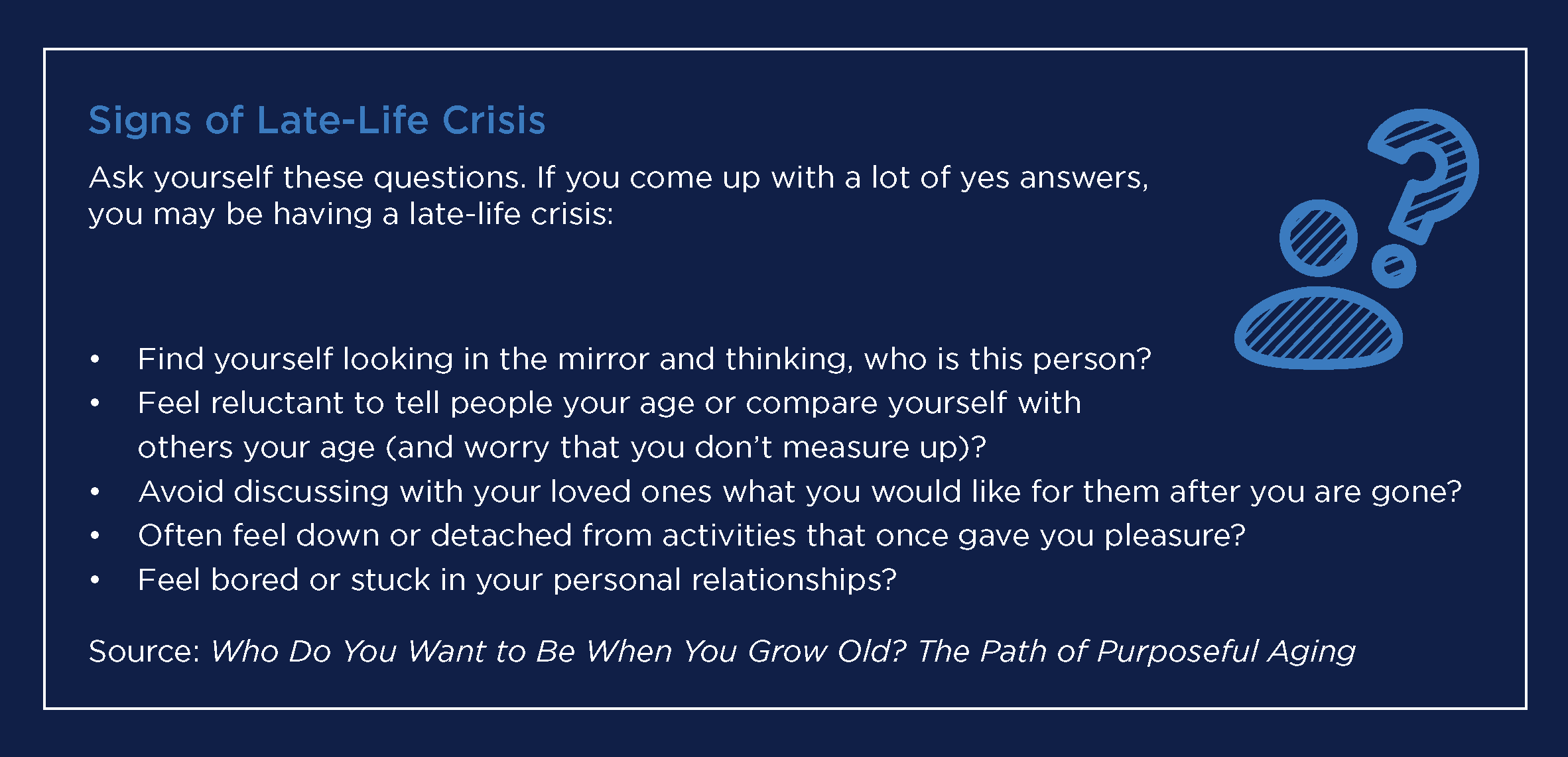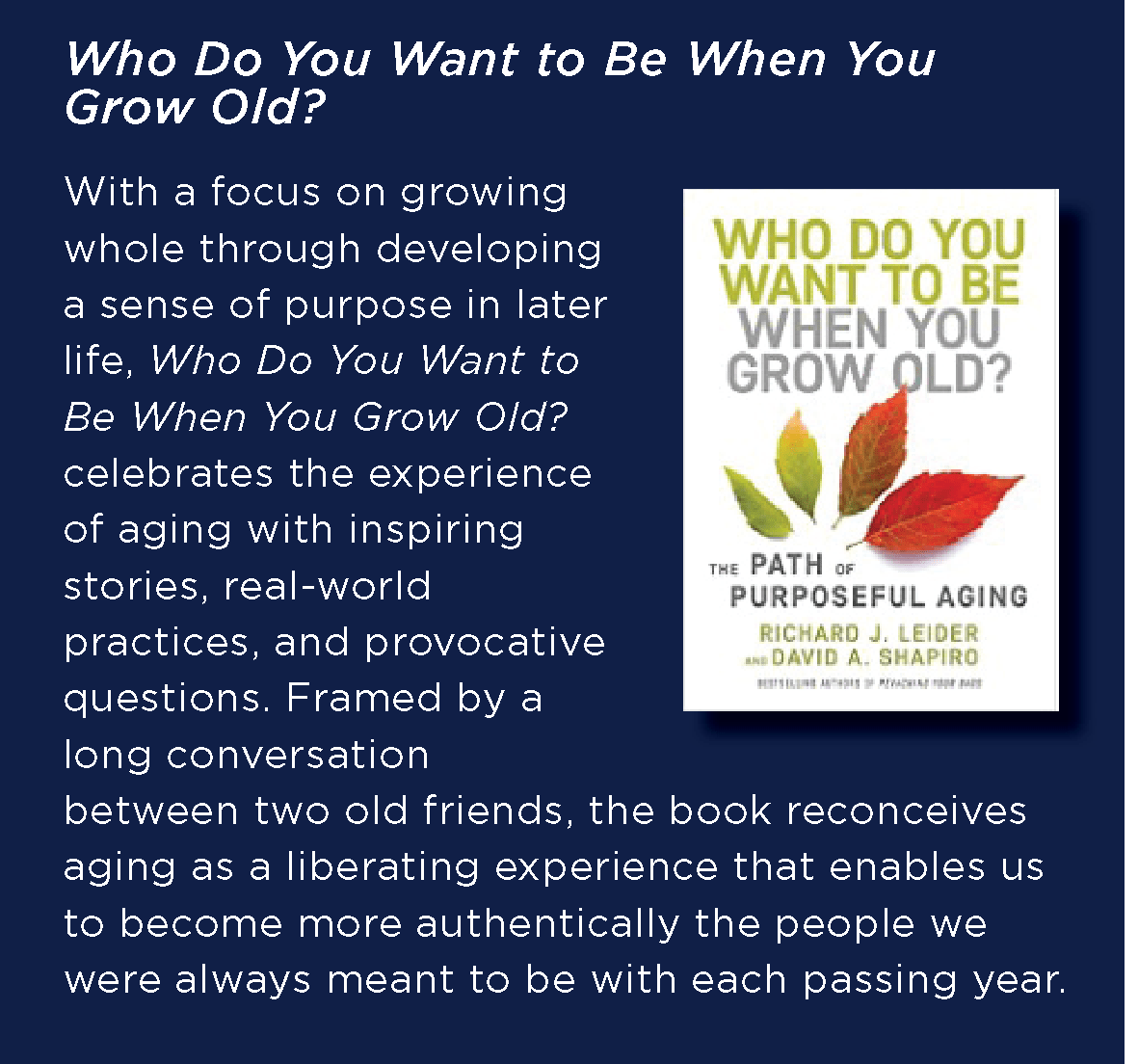Living Through a Late-Life Crisis
But when it was over, he says, he felt a huge letdown. “I felt like, What’s next? I’ve done it all. I’ve reached the summit. And now it’s all just downhill.” Shapiro, 65, says he experienced a late-life crisis.
As Shapiro and his coauthor Richard Leider wrote in their recent book Who Do You Want to Be When You Get Old?, the late-life crisis differs from the better-known mid-life crisis—and not just because it happens at a later age. “Whereas the mid-life crisis is typically about the loss of opportunities, the late-life crisis is more about the loss of relevance,” say Shapiro and Leider.
It’s a crisis, they write, “characterized by dissatisfaction; a loss of identity; an expectations gap; and the feeling that life has peaked, so it’s all downhill from here.”
While the mid-life crisis has been a topic of debate among social scientists for many decades, the idea of a late-life crisis is newer and less studied. One small study in the UK found that one-third of older adults reported such a crisis in their 60s. The researchers, led by psychologist Oliver Robinson of the University of Greenwich, found that bereavement and life-threatening illnesses were common triggers. But so was retirement. The common denominator, the researchers wrote, was “a sense of loss.”
Shapiro says he emerged from his crisis with the help of a mentor: Leider, who is a well-known life coach, author, and speaker, and the founder of Inventure – The Purpose Company. He also emerged with his own new sense of purpose, which included writing the book, the latest of six that he and Leider have authored together.
If you are in a late-life crisis—or fear you could be headed for one—Shapiro and Leider have some advice.
Recognize Early Signs
We all have days when we wonder, is this all there is? But a late-life crisis is different because it lingers. It may begin gradually or suddenly. For example, Shapiro says, a new retiree suddenly may realize that he or she literally has “no reason to wake up in the morning.” Or perhaps “one day you can’t do the yoga pose that you did yesterday or take that hike that you always took,” he says, and you instantly feel old and decrepit. The death of a loved one, a friend, or even a pet can shake your world, making you painfully aware of your own mortality.
Or there may not be a big triggering event. “It can be a kind of creeping crisis that sort of sneaks up on you as well,” Shapiro says.

Who’s Most Vulnerable
Not surprisingly, people who build their identities around their jobs can be especially vulnerable to a crisis after retirement. “When we no longer have that what—Oh, I’m a college professor, or an accountant, or an executive—the question of who I am emerges more strongly,” Shapiro says. “When the container of one’s job is no longer containing us, many people feel a loss of identity and a sense of what’s my purpose in the world?’’
Isolation can trigger or worsen a late-life crisis. That’s one reason that people who move during retirement can be vulnerable. “People with stronger community connections and stronger friendships are less likely to suffer,” Shapiro says.
Also vulnerable, he says, are people who “feel less of a connection to something larger than themselves.” That something can be a traditional religious sense of “the divine,” he says, or “something more like a connection to the divine through nature.” Some people feel that connection when they pray; others find it while meditating or walking through a forest.
Look to the Past
While it might seem counterintuitive, Shapiro says, looking to your past—not to lament, but to learn—can help. “We encourage people who find themselves experiencing a late-life crisis to delve into their past, not in a nostalgic way, but rather in an investigative way and see what you can learn.”
Previously in your life, when have you found yourself in similar situations, what have you done? What sort of connections have you made earlier in life that are meaningful? How can you rediscover and retell the stories of your life in a way that addresses the crisis you are experiencing?
The idea is not to look to what you “could have, should have, would have done” differently but to look at the wisdom you gained, Shapiro says. He and Leider urge people to pursue the kind of self-reflection that leads to action, not the kind of self-absorption that leads to more despair.
For many people, writing about past and current challenges in a journal can be helpful. If you don’t like to write, use a voice recorder instead.
Connect across Generations
Just as young adults benefit from mentors, older adults can benefit from getting to know “paragons of elder virtue” living meaningful lives, Shapiro says. Make an effort to seek them out in your community. Try to connect with younger people too. Spending time with people of multiple generations can build a “sense of connection over time” that puts your life into a broader context, Shapiro says. Grandchildren, he says, very much count.

Just Do It
Once you have some ideas for pursuing a life of greater purpose, take a first step or two. “It can sound a little glib to say, just start meditating, start journaling, start volunteering,” Shapiro says, but “taking the first step is the hardest part.” If you are struggling, try enlisting a friend to explore new pursuits with you and keep you accountable.
Keep Asking Questions
In your journal, or in conversation with your peers or mentors, try asking yourself some of these questions, Leider and Shapiro suggest: Why do I get up in the morning? What are my core values? How can I grow a little bit today? Am I living a default life—one that just happened to me—or a life of my choosing that reflects my core values? If not, how can I move toward that vision? How do I want to be remembered?